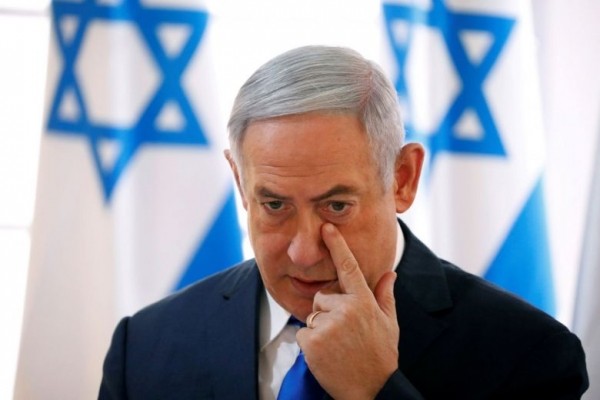
Israeli Prime Minister Benjamin Netanyahu gestures during a weekly Cabinet meeting.
JERUSALEM (REUTERS) – Israeli Prime Minister Benjamin Netanyahu’s battle for political survival looked set to stretch on for days or weeks after exit polls following Tuesday’s (Sept 17) election showed the race too close to call.
The surveys by Israeli television stations gave Netanyahu’s right-wing Likud 31-33 of parliament’s 120 seats compared with 32-34 for the centrist Blue and White led by former general Benny Gantz.
They indicated that Netanyahu’s ally-turned-rival, ex-defence minister Avigdor Lieberman, could be the kingmaker, with the backing of his far-right Yisrael Beitenu party critical to the formation of any ruling coalition.
“Netanyahu has lost, but Gantz hasn’t won,” said Udi Segal, a prominent Israeli television news anchor.
Without Lieberman’s support, the polls suggested, Likud could put together a right-wing coalition controlling only up to 57 parliamentary seats, while Blue and White could enlist no more than 58 legislators – meaning both parties falling short of the 61 needed for a governing majority.
Lieberman was forecast to capture 8-10 seats, up to double his current tally in parliament, making him the linchpin.
The election was called after Netanyahu, 69, failed in efforts to cobble together a coalition following an April ballot in which Likud and Blue and White wound up in a dead heat, each taking 35 parliamentary seats.
It is the first time Israel has had two general elections in a single year.
The two main parties’ campaigns pointed to only narrow differences on many important issues: the regional struggle against Iran, the Palestinian conflict, relations with the United States and the economy.
An end to the Netanyahu era, after a decade in power, would be unlikely to bring about a significant change in policy on hotly disputed issues in the peace process with the Palestinians that collapsed five years ago.
Netanyahu, Israel’s longest-serving prime minister, has announced his intention to annex the Jordan Valley in the occupied West Bank, where the Palestinians seek statehood.
But Blue and White has also said it would strengthen Jewish settlement blocs in the West Bank, with the Jordan Valley as Israel’s “eastern security border”. The Palestinians and many countries consider the settlements to be illegal.
KINGMAKER
Lieberman, a Jewish settler from the former Soviet Union who ran on a platform of limiting the influence of ultra-Orthodox rabbis and politicians on everyday life in Israel, has said he seeks a “national unity” government with the two major parties, Likud and Blue and White.
That could be complicated: Lieberman has said he would not join a coalition that included ultra-Orthodox parties – Netanyahu’s traditional allies.
Gantz has ruled out participating in an administration with Netanyahu, if the Israeli leader is indicted on looming corruption charges.
As in the election five months ago, his opponents, including Gantz, focused on bribery and fraud allegations against Netanyahu in three corruption cases.
The prime minister, due to face a pre-trial hearing in October to argue against the charges being filed, has denied any wrongdoing.
An election loss could leave Netanyahu more at risk of prosecution, without the shield of parliamentary immunity which his political allies had promised to seek for him. And there is no certainty they would stand by a weakened leader without an obvious public mandate in any coalition-building.
Netanyahu portrays Gantz, 60, as inexperienced and incapable of commanding respect from world leaders such as US President Donald Trump. Before the last election, Trump gave Netanyahu a lift with U.S. recognition of Israeli sovereignty over the Golan Heights, captured from Syria in the 1967 Middle East war. This time, the White House seems more preoccupied with Iran.
The Trump administration plans soon to release an Israeli-Palestinian peace plan that may prove a dead letter: The Palestinians have rejected it in advance as biased.
Netanyahu’s open door in Washington and other world capitals, at a combustible time on Israel’s borders with Syria, Gaza and Lebanon, remains a big draw domestically.
n the final hours of campaigning, Netanyahu strained every sinew, urging voters to support him to avert what he described as the “disaster” of a left-wing government.
His voice hoarse, the veteran leader took to the streets and social media, at one point using a megaphone in Jerusalem’s bus station, to appeal to voters to extend his unbroken decade in power.
“There’s no one else running who is worthy of being prime minister,” said Alon Gal, a 53-year-old hi-tech manager. “With (Netanyahu), at least I know who I am dealing with.”
In Gaza, Palestinians awaited the results of the vote.
“This election affects many things in our life,” said Mohamad Abdul Hay Hasaneen, a janitor in the city of Khan Younis. “There might be limited escalations after the election, but I don’t think this would result in a full war.”
